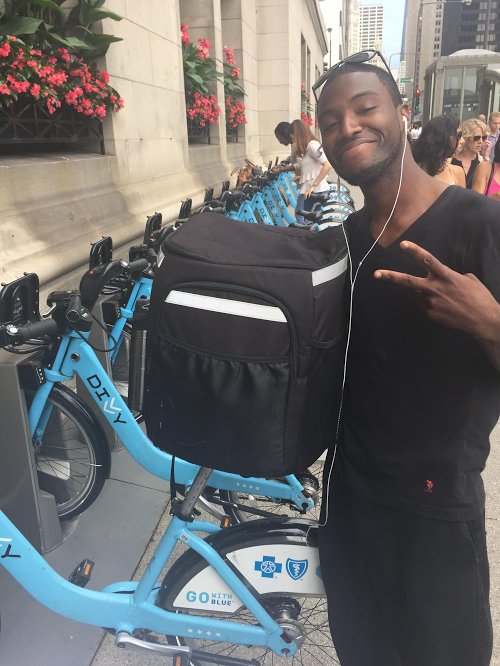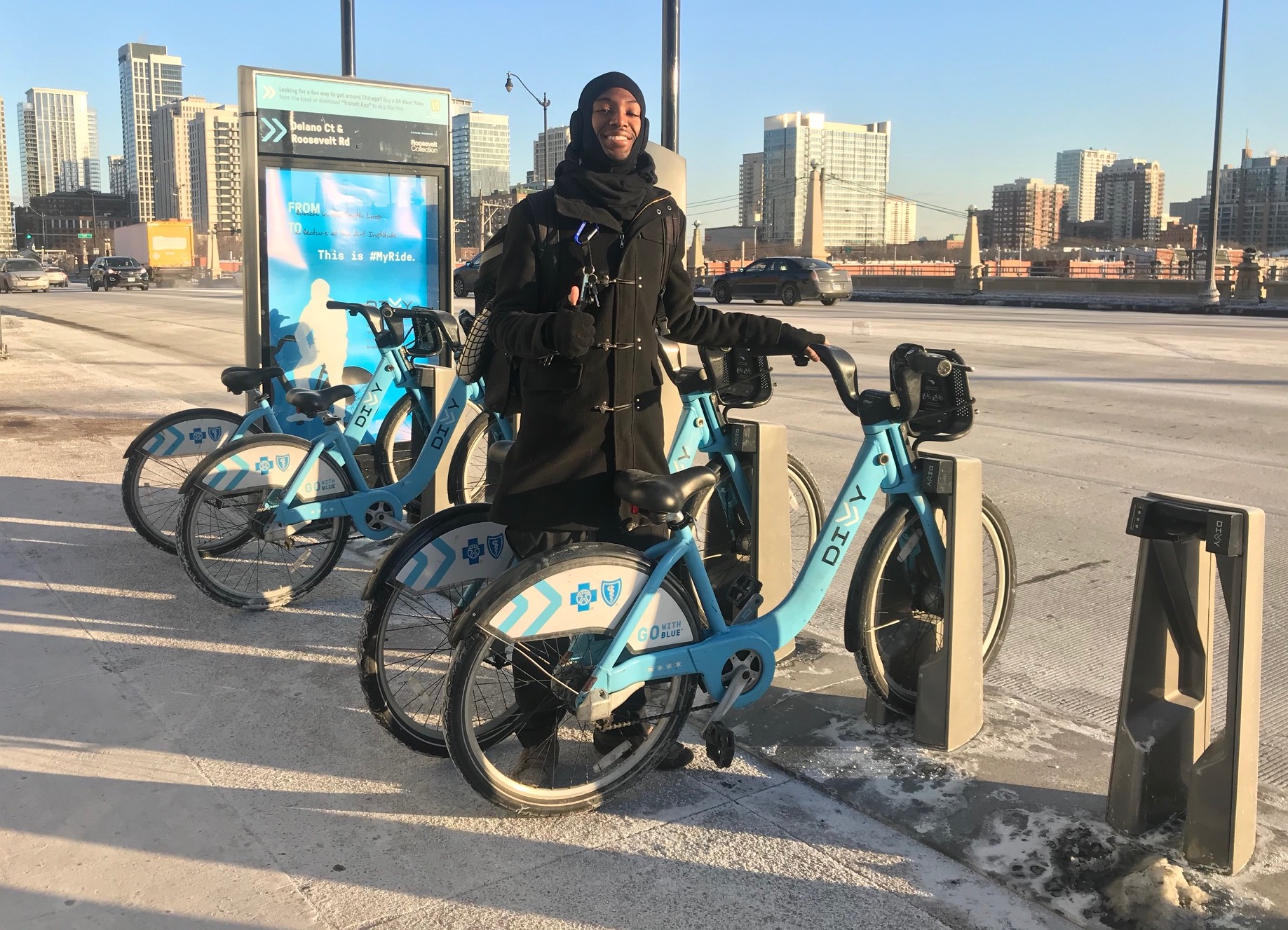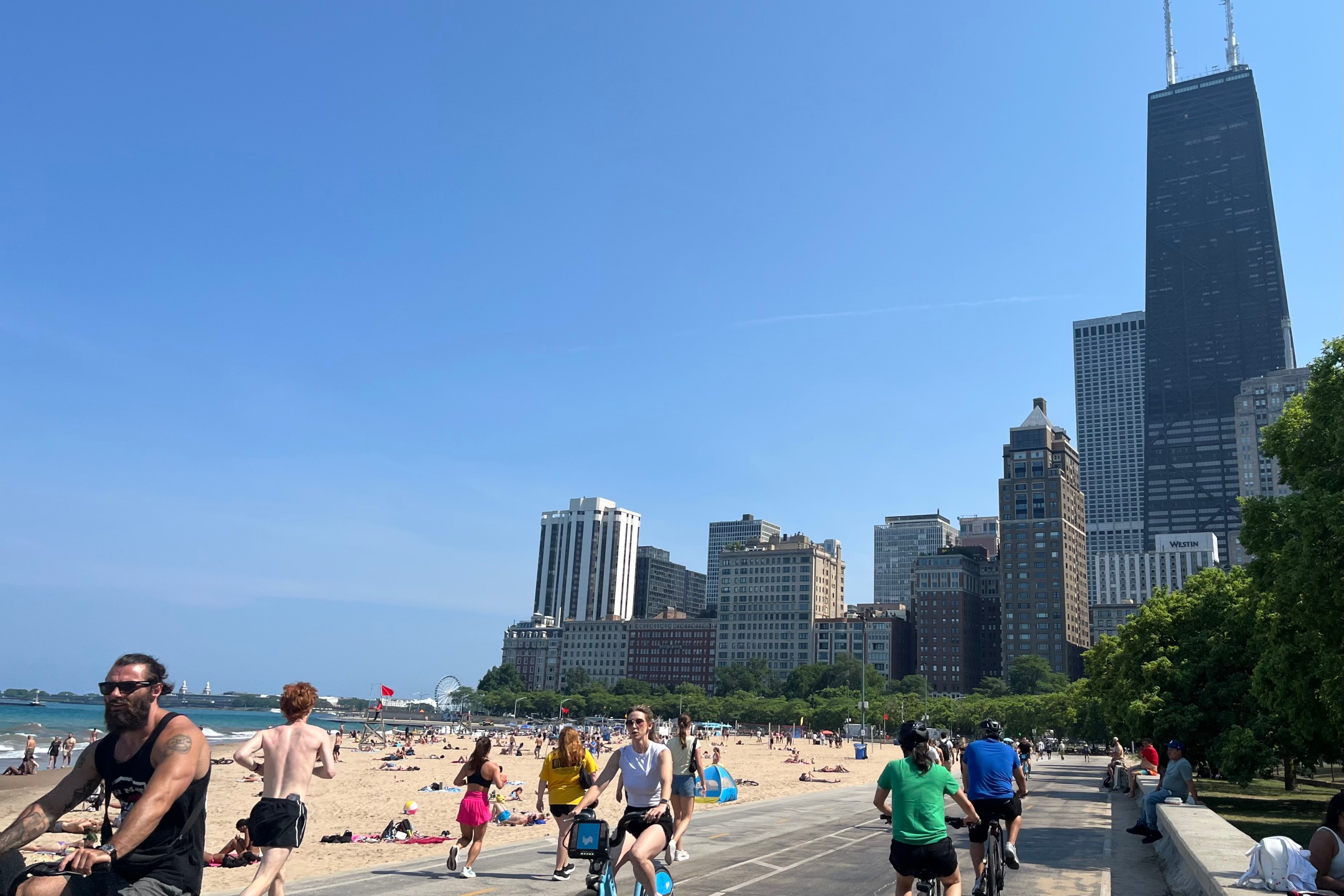[Streetsblog Chicago editor John Greenfield publishes a weekly transportation column in the Chicago Reader. We syndicate the column on Streetsblog Chicago after it comes out online.]
On January 2 my mind was blown by a tweet from the Divvy bike-share account congratulating a guy named Kerdia Roland for being their number-one rider of 2017 with a staggering 2,462 trips for the year. “That’s 6,275 miles of riding – enough to get you to Alaska!”
Farther than that, actually. Google Maps provides a 3,574-mile bike route from Chicago to Anchorage, but Roland pedaled far enough to cover the 6,234 miles from Madrid, Spain, to Ulaanbaatar, Mongolia.
As I gazed at the accompanying photo of the smiling young man flashing a peace sign by the Union Station Divvy docks, it dawned on me that the large black cube he was holding was an insulated delivery box. Apparently this guy had racked up all these miles while making runs as a food courier using these relatively slow, 49-pound bikes, kind of like racing the Kentucky Derby on a Clydesdale. What the hell?
Roland, a 25-year-old South Loop resident who takes delivery orders via the Postmates, Caviar, and Uber Eats smartphone apps, says his strategy isn’t as crazy as it sounds. He argues that not having to worry about bike theft and maintenance is well worth the few miles-per-hour he sacrifices by using bike-share instead of the featherweight fixed-gear bikes often preferred by couriers.
A lifelong Chicagoan who grew up in Streeterville, Roland transports everything from Big Macs to pricey French-Vietnamese cuisine from Le Colonial in the Gold Coast. While he mostly works in the Loop and River North, deliveries have taken him as far afield as Lincoln Park, Pilsen, and Hyde Park.
Roland says he started using Divvy for deliveries after thieves nabbed three of his personal bikes, one of which he spent hundreds of dollars customizing. “Losing that one was like an arrow to the heart.”
“For me Divvy is really convenient and cost effective,” he says. “The initial cost of a good bike can be pretty steep, $500-800, but my Divvy membership is only about $10 a month.” Moreover, Roland argues, fixing flats is a hassle, or expensive if you pay a shop to do it, but when you’re a bike-share member the staff maintains the cycles for you.
But isn’t it a pain in the neck to ride to a Divvy station near a restaurant, dock, walk to the eatery to pick up the food, return to the station, and do the same thing at the delivery point? “No, I keep a little U-lock on me and lock up the wheel of my bike outside the restaurant or the residence,” Roland responds.
He keeps an eye on the clock so that he never accrues the late fees Divvy charges if you keep a bike for more than 30 minutes at a time. And while he used to need a smartphone to locate the stations, he says he now knows all the downtown docks by “muscle memory.”
Roland also claims that using a bike that’s at least twice as heavy as a typical courier cycle doesn’t slow him down much. “Don’t get me wrong, I put in twice as much effort, but I’ve gotten comfortable with that.”
While Roland has had a few run-ins with drivers, “I’ve fallen but I’ve never broken and bones or bled or anything, thankfully.” He’s also had excellent luck finding valuable stuff that’s been left in the street, including a pair of expensive Apple AirPods earbuds and a total of $287 in dropped cash last year.

“I really love this job,” Roland says. “It’s a source of joy and satisfaction, and it’s an adventure for me every day.”
He adds that courier work serves as a stepping stone for his longterm goal of making a living through an online retail website for organic nutritional supplements, bodycare products, and cleaning supplies. He currently sells these items via an Amway webpage and gives out free samples, such as Nutrilite Twist Tubes 2GO, containing a beverage mix that’s supposed to boost your immune system, to his delivery customers.
While you’re technically not allowed to use your own lock while riding bike-share, Roland says Divvy staffers were thrilled to hear he uses the bikes to make deliveries. “They love the fact that I’m using the bikes to earn an income.”
Divvy spokeswoman Kelly Goldthorpe confirmed this. “We’re delighted that Divvy has been able to enable his work across the city. His story shows how Divvy has become integral to the Chicago transportation network… We hope Kerdia takes even more trips in 2018.”
Those who are familiar with Divvy’s demographic challenges might be surprised to hear that the system’s most prolific rider is African-American. A 2015 survey found that 79 percent of annual members are non-Hispanic whites, a group that currently only makes up about 33 percent of the Chicago’s population, and membership also heavily skewed male, young, affluent, and well educated.
A publicly subsidized transportation system that mostly serves relatively wealthy Caucasians isn’t equitable. Organizations like the black- and Latino-led bike group Slow Roll Chicago have also pointed out that lower ridership means that people of color are missing out on the mobility, health, and economic benefits of cycling.
Since the survey was conducted, the city has focused on expanding the bike-share system into more communities of color in an effort to address this imbalance. In addition, the Divvy for Everyone (D4E) initiative, which launched in summer 2015 and offers one-time $5 annual memberships to Chicagoans making less than $35,310 a year and waives the usual credit card requirement, is helping to level the playing field. The city has been promoting the program on the south and west sides via Divvy outreach staff and the Chicago Department of Transportation’s Bicycling Ambassadors, and there are currently 1,730 active D4E members.
However, low use of Divvy stations in Chicago’s black and brown neighborhoods recently emerged as a financial issue for the city. Last month the Chicago Tribune’s Mary Wisniewski reported that Divvy’s net income plummeted from $2.84 million in 2015 to $1.97 million in 2016, largely due to poor ridership numbers for recently installed stations in lower-income communities. For example, while the 36 stations in Lincoln Park saw a total of 452,727 trips between July 1, 2016, and June 30, 2017, the 14 stations in Austin saw a mere 1,339 trips during the same period.
But Roland says he appreciates the west side stations because his six-year-old daughter Kenya Meadows lives with her mother in North Lawndale. The docks by the Kedzie Pink Line stop come in handy when he travels to Kenya’s home, and there’s another station a few blocks from her school that he uses when he picks her up.
A recent Portland State University study of barriers to bike-share that surveyed residents of underserved neighborhoods, including Chicago’s Bronzeville, found that concerns about traffic safety, crime, police harassment, user fees, and liability for the bikes are factors in low ridership. The report also revealed that many residents in these neighborhoods are unclear about how the systems work, and argued there's a need for more one-on-one outreach regarding the advantages of using bike-share.
Roland reports that when he rides through African-American neighborhoods some residents do seem “kind of confused.” And he agrees with the PSU study that more promotion will be required if Chicago wants to increase bike-share ridership in communities of color.
“The city needs to do a better job of communicating the benefits,” he says. “Having a car in Chicago isn’t as good as most people think it is – you still have to deal with traffic jams and it’s stressful.” He adds that Divvy is also more reliable than the el. “There are no delays. I try to ride lawfully, but how fast I get someplace is largely within my control.”
City officials would be wise to heed Roland’s advice and shift their Divvy-vangelism to an even higher gear.



